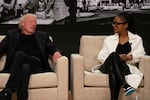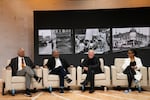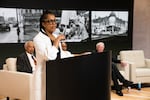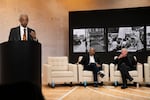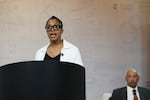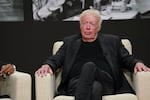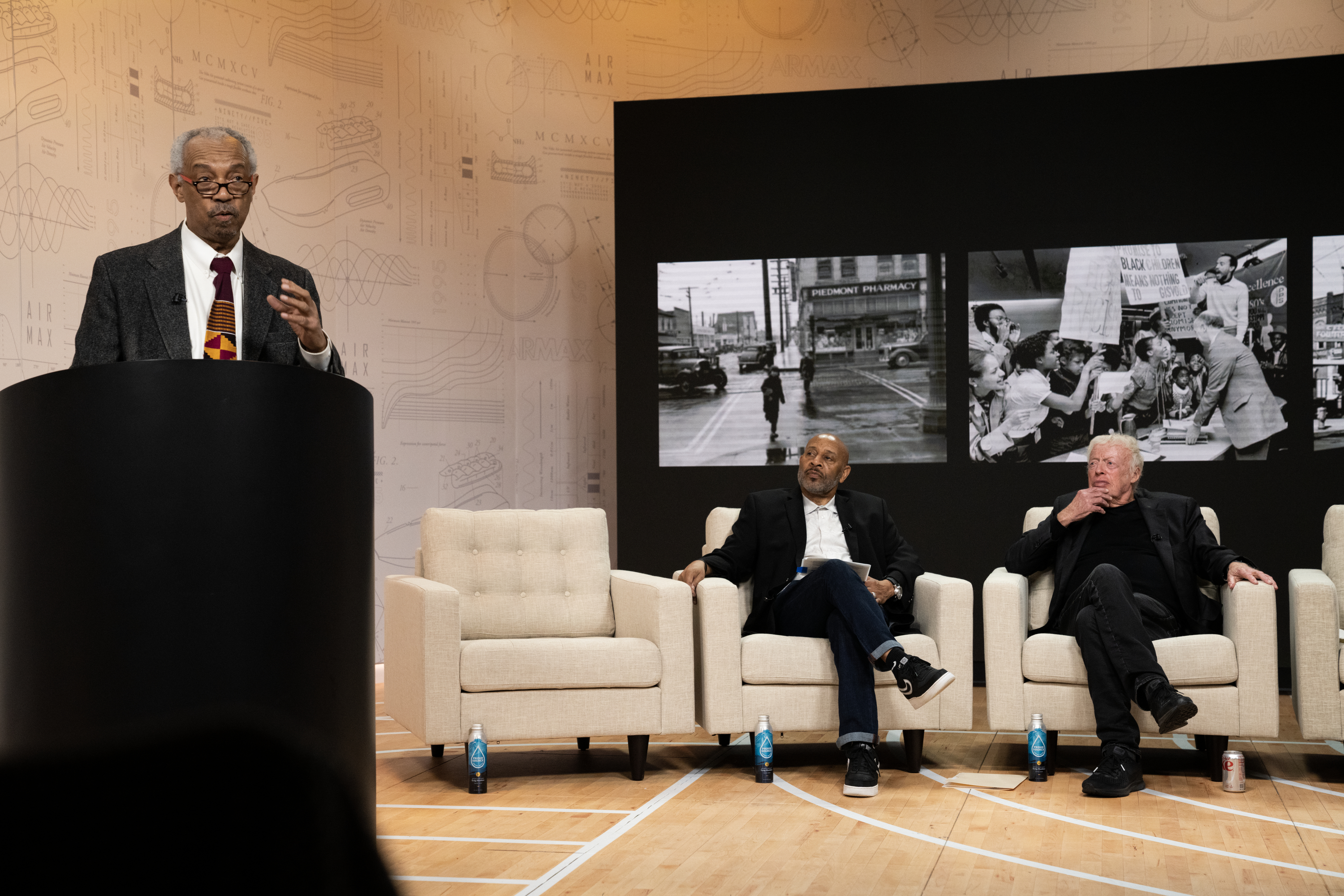
FILE - Albina Head Start CEO Ron Herndon speaks at an event announcing Nike co-founder Phil Knight's donation of $400 million to the 1803 Fund on April 24, 2023 at Nike headquarters in Beaverton, Oregon. The fund is devoted to supporting Portland’s Black residents.
Jonathan Levinson / OPB
Earlier this month, Nike told the Soul District Business Association that the company would be closing its store in Northeast Portland permanently. Ron Herndon was one of the people who brought that store to Northeast Portland in the 1980s. As a leader in the community organization Black United Front, Herndon helped convince Nike to support and invest in the Black community. We talk to Herndon about the legacy of the store and what the closure means for the neighborhood.
The following transcript was created by a computer and edited by a volunteer:
Dave Miller: From the Gert Boyle Studio at OPB, this is Think Out Loud. I’m Dave Miller. There have been a lot of high profile retail closures in Portland over the last year including the Pearl District REI, Andy and Bax, and some Walmart and Starbucks locations. Earlier this month, we learned about another one, one that has its own unique history. Nike told the Soul District Business Association that it would be permanently closing its store on MLK Boulevard in Northeast Portland. Ron Herndon was one of the people who made that store a reality as a leader in the community organization Black United Front. Herndon helped convince Nike to support and invest in the Black community.
Ron Herndon joins us now to talk about the legacy of this store and what its closure might mean going forward. Welcome back to Think Out Loud.
Ron Herndon: Thank you, David.
Miller: You became famous in Portland for your work with the Black United Front to help Black kids in Portland Public Schools. But you had, it seems, a kind of parallel project with larger corporations in Portland. What were some of the problems that you were trying to address with companies like Fred Meyer or Safeway?
Herndon: The Black United Front aggressively addressed the multiple forms of institutional racism that were being inflicted upon the Black community. We approached Safeway, Fred Meyer, Albersons. We said, “Hey, look, you’re in the Black community. You hire very few Black people and by the way, we’ve done price checks on your store and compared them to stores and white communities and we find that you’re charging Black people more money, and in certain cases, the store is not being kept well.” So those conversations resulted in hiring programs with those stores that resulted in Black people being hired, prices being lowered.
And we also approached a soft drink bottling company that had no Black employees and said, “Hey, look, we have hiring programs we’ve established at three or four corporations here in Portland. We’d like to set one up with you since you have no Black employees.” They essentially told us to take a hike. We said, “Ok.” We began a boycott of all their products. Black restaurants, mom and pop stores stopped carrying their products, and after about a month, they got in touch with us, which resulted in a hiring agreement with them that resulted in Black people being hired there. So when we approached Nike, we wanted to help them and help the Black community develop a partnership that would have an impact, not only here in Portland, but nationwide.
Miller: Nike seems a little bit different from those other examples where you were, for example, trying to get a company to not have racist hiring practices. Here, you were trying to get a multinational corporation, based in our backyard, to open up a store. Why Nike?
Herndon: Initially, when we approached them, we talked about several different avenues that we thought they could pursue such as doing business with Black vendors, doing business with Black banks. So it wasn’t on the top of the agenda. But when we began to talk to the gentleman at that time who was the CEO of Nike, Bob Waddell, he and I had several meetings about what they could do concretely. And the idea was developed about a community store, a factory outlet store that would be located in the Black community and that a percent of the pre-tax profits would go to help community organizations and they would hire from the Black community. This had never been done by Nike anywhere in the country. We thought it was a great opportunity and we shook hands. And I’ll never forget. He said, “Look, we’ve never done this before. We’re going out on a limb. We hope you’ll be with me.” And my comment was, “Bob every morning I wake up, I’m out on a limb.”
Miller: What did the store end up meaning for the community?
Herndon: Oh, it was a tremendous source of pride because, mind you, the Black United Front was a community-based organization. We did not receive money from any outside institution. We passed the hat and we aggressively fought to mitigate the forms of racism that I mentioned earlier. But it was a tremendous source of pride. Members of the community were hired there. Money from the store did go to help Black institutions.
And one of the things that Nike found out, was after the store was set up, the majority of the people who were shopping at the store were white and did not live in the Black community. Now, mind you at that point in time, there were no major corporations in Portland investing in Albina. The story was if you put money there, you’re gonna lose it. The only people who invested in Albina at that point were people who were investing in illicit activities. But once Nike came in, there were a number of other corporations that got involved in development in Northeast Portland.
So it really was a tremendous source of pride and accomplishment because when the Black United Front approached Nike, we did not involve any institution of government, be that city government, state or county government. This was a community-led issue. Nothing like it had ever been done and it became so successful that Nike replicated this in several other large cities in America.
Miller: What went through your mind earlier this year when the store was closed at that time temporarily because of security concerns?
Herndon: Tony Hopson is the CEO of Self Enhancement Inc. He and I had several conversations with Nike administrators about the store and why we thought that every effort should be made to keep the store open. And during those conversations, it kept coming up that more theft is occurring at this store than any other Nike store in the country, that we can’t keep going on like this. We made several suggestions about security guards. And at that point in time they said, “We have a policy of not having armed security guards.” And we said, “You should revisit that policy because theft will continue until people feel that there is the threat of arrest and conviction.”
So they said, “Ok, what we’ll do is ask the City [of Portland] if they will allow us to hire and pay for off-duty cops.” And along with that, they said that they would approach the City and see what would be the response time if, in fact, a person was arrested there. How long would they have to be physically held before they expect a cop to show up? The City turned down the request for Nike to pay for off-duty cops and they never came up with a definitive answer about response time.
You can’t just hold somebody in front of a store forever without knowing that a car from the police department is going to show up and arrest them and take them to be booked. So after all those conversations and we saw that Nike went the extra mile to even change policies to keep that store open, yes, I’m saddened by the store’s closure. But I can understand given the lack of help that they receive from City Hall. I can understand.
Miller: Were you at all conflicted about asking for what, in the end, was going to amount to a larger police presence in a historically Black neighborhood?
Herndon: No, I wasn’t. Not for a New York minute. Any institution that has opened its doors needs to know that they are able to serve their customers, their customers will be safe, their employees will be safe. If you have individuals who take it upon themselves to ignore that and they think that they can make a living by walking into a store, picking up product, walking out, and doing that every day then, as far as I’m concerned, yes they need to be arrested. Yes, they need to be convicted. I have absolutely no qualms about that.
Miller: The Nike store, as I noted in my intro, is just one of many retail or restaurant locations that have closed over the last year in Portland. All talking about the same thing, talking about security concerns. What do you think, if anything, is different about the case of this one Nike community store?
Herndon: It hurts more because it was the Black community that approached Nike and it was the Black community in Portland. It’s responsible for not only that store but several stores like it that Nike has opened across the country. So yes, it hurts. There are very few communities that are able to say they have that kind of success working with a Fortune 500 company. What I’m also thinking, as a matter of fact hoping, in my conversations with the brass at Nike, they said they’re not deserting Northeast Portland, not deserting Albina. And they are looking forward to building a new store and hopefully they will have more support from the City at a new store in Northeast Portland.
And I must say that from the very beginning, from the first conversations with Nike about starting the community-based store, they have never misled me. The store was started. There was no contract. It was started with a handshake between Bob Waddell and myself. And over the last 40 years, any time I’ve approached Phil Knight and asked that he support efforts that helped Head Start nationally, he has never hesitated and never asked for one sentence of publicity. So if the brass and Nike tell me that they’re going to do something, I’ve learned to trust their word.
Miller: Ron Herndon, thanks very much.
Herndon: Thank you.
Miller: Ron Herndon is the director, since 1975, of Albina Head Start.
Contact “Think Out Loud®”
If you’d like to comment on any of the topics in this show or suggest a topic of your own, please get in touch with us on Facebook, send an email to thinkoutloud@opb.org, or you can leave a voicemail for us at 503-293-1983. The call-in phone number during the noon hour is 888-665-5865.


